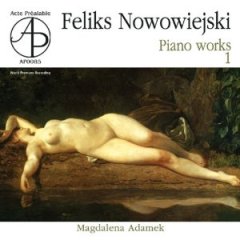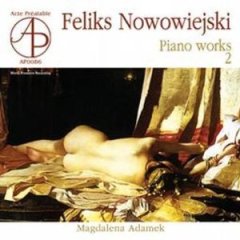Feliks Nowowiejski - Piano works (2002 – 2003)
Feliks Nowowiejski - Piano works (2002 – 2003)

Vol.1 01. Gavot [0:03:32.66] 02. Fairy-tale [0:02:33.73] 03. The Polish Dance no.1 [0:04:45.59] 04. The Polish Dance no.2 [0:03:29.16] 05. The Polish Dance no.3 [0:03:54.10] 06. March [0:03:22.40] 07. Prelude n.1 - original version [0:02:07.72] 08. Prelude n.1 - second version [0:02:23.14] 09. Prelude n.2 [0:02:13.70] 10. Balade n.1 [0:07:14.05] 11. Balade n.3 [0:05:22.05] 12. Balade n.4 [0:05:47.21] 13. Mazurka n.1 [0:04:00.42] 14. Mazurka n.2 [0:04:07.47] 15. Gen. Dowbór-Kusnicki Military March [0:03:27.42]Vol.2 1. Easy classical and contemporary dances for children 2. Album leave 3. Kashubian dance Borowiak 4. Balalde no. 2 in A major op. 20 no. 2 5. Slavonic picture (Obrazek slowianski) 6. Mazurka no. 3 in D minor 7. Mazurka no. 4 in A minor; 8. Mazurka no. 5 in E minor 9. Threnody (Tren) Op. 20 no. 3 10. Gontyna in Arkona 11. Poezja starego Krakowa 12. Praetorian's March from Quo vadis Magdalena Adamek – piano
Nowowiejski's name has fallen pretty much into oblivion but in his day he was a significant presence in Polish and indeed international musical life. He studied at the Stern Conservatory in Berlin and pursued his earlier career as an organist. He was a prizewinner: his Under the Banner of Peace won a London competition in the early years of the twentieth century. He met Dvorák and studied for a time with Bruch until 1906. His early major success was his oratorio Quo Vadis, premiered in 1907, which he conducted in Carnegie Hall in 1912. A more patriotic success was his song Rota, which in time became a second Polish national anthem. His life in Cracow was not unclouded by spats with a leading critic so he upped sticks to Berlin returning after war's end to take a leading role in the revivification of Polish culture and language after independence. His last years were difficult; he hid his manuscripts during the Second War and though he still composed Fourth Symphony, a Piano Concerto, he suffered a stroke and died in 1946.
Magdalena Adamek has scoured the surviving albums and manuscripts with penetrating editorial insight. She brings her accumulated experience to bear in these two volumes of the composer's piano music both volumes are available separately. Her playing is crisp, warm and inviting, though she has a tendency to push the tempi in the more substantial works. That said many of these pieces happily fall into the genre categories light music, salon or consciously paying homage to the shade of Chopin. Little here will give one a frisson or indeed intimations as to the big works for which he was famed. Certainly his smaller morceaux have some delicious moments but they are circumscribed pleasures and not to be taken at one go.
The Polish Dances are distinctly Chopinesque in flavour and probably written in the 1930s; to that one can add a certain amount of Szymanowski's influence. The First Ballade is one of the warmest and most immediately attractive things here, and once more steeped deep in the influence of Chopin. The Fourth has poetry and drama but one should perhaps turn in preference to the Mazurkas, which seem to me to be more comprehensively successful and to have a greater stamp of personality. We also have his 'Young Poland', London prize-winning march, Under the Banner of Peace, a jaunty affair. As an aside I should add that the rather haphazard programming means that we can't journey with any chronological certainty through his oeuvre. This is a pity as his later works were far better at assimilating the diverse influences he'd earlier accumulated.
Rather like his younger Polish colleague Józef Koffler, also championed by this label, Nowowiejski wrote a children's cycle. The Easy classical and contemporary dances for children doff the cap to Mozart and Chopin and are agreeable enough. We really need to turn to the second volume's E minor Mazurka to find the composer at his best strenuous and powerful but with moments of intense reflection. It would have been better not to have split the Mazurkas between volumes because they represent some of the most persuasive compositions here. The Threnody is similarly impressive it sounds like a piano reduction of a much bigger orchestral work. We end with the Praetorian's March from Quo Vadis. I hope we have the opportunity to hear his magnum opus in the not too distant future.
Recorded in a rather airless and unflattering acoustic these are nevertheless all first ever recordings and as such strongly to be welcomed. The best of him lies in the later works from the 1930s and those Mazurkas in particular. There may be a great deal of generic ephemera to wade through elsewhere but it's well crafted of its kind and the greater rewards are certainly there. ---Jonathan Woolf, MusicWeb International
download:









